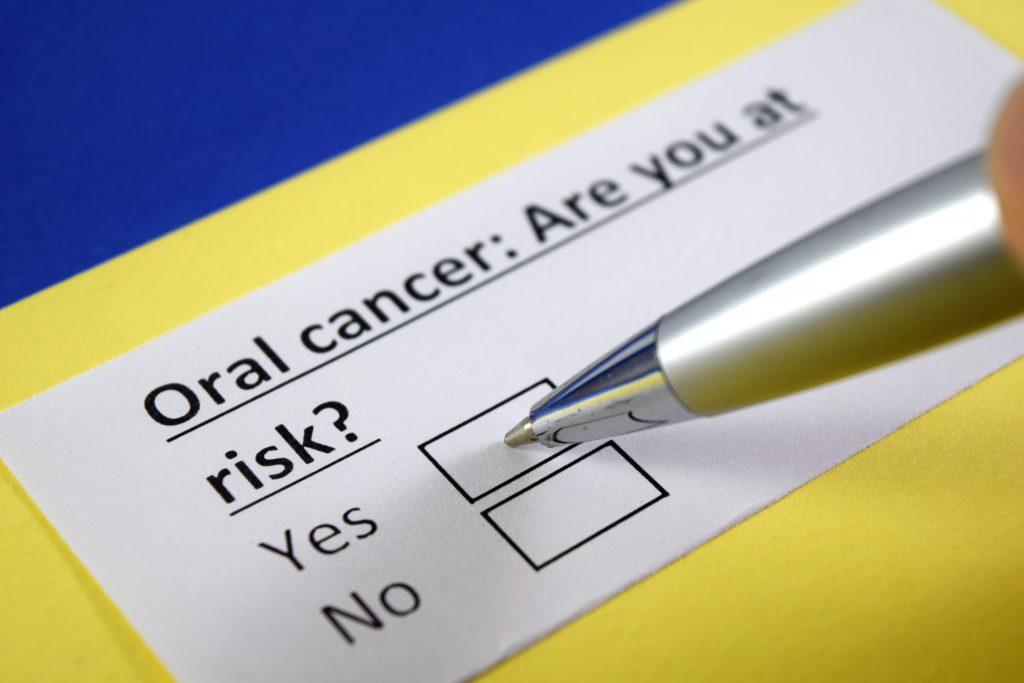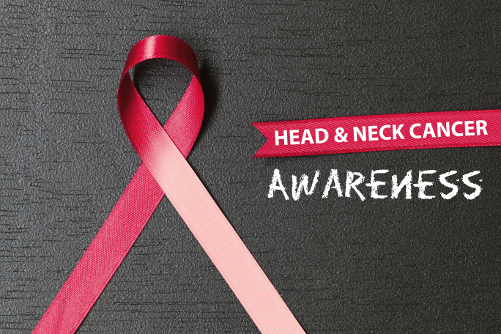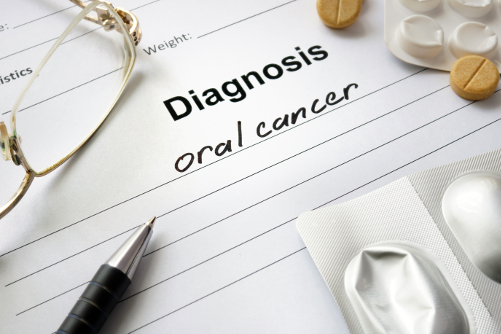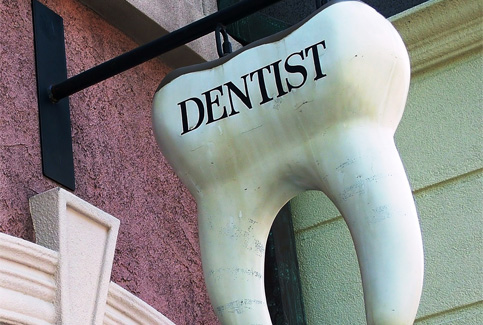Oral Cancer – 6 Things
-

Have you ever been screened for oral cancer? More than 48,000 Americans are diagnosed each year according to The Oral Cancer Foundation. The good news is that if oral cancer is caught in its early stages, it has a very high survival rate (80 to 90 percent). The bad news is that most diagnosed cases are late stage and boast a five-year survival rate of less than 50 percent. Considering this it’s important to be proactive in managing oral health.
Dentists are often the first line of defense when it comes to screening for and diagnosing oral cancers. Given their experience with oral health, they are able to identify any of the early signs associated with cancer of the mouth or lips. If you maintain the ADA-recommended twice yearly visits to your dentist, you can limit your risk of developing late-stage terminal oral cancer.
Here are six important things to know about oral cancer:
-
1. Head and Neck

Oral cancer is actually classified as a head and neck cancer. It can affect the mouth, lips, tongue, gums, salivary glands and throat. Your dentist is trained in diagnosing any variety of oral cancer.
-
2. Know the Signs

Although oral cancer can be largely asymptomatic, there are a number of signs and symptoms frequently associated with the disease. These can include:
- Mouth pain
- Bleeding from the gums, cheeks or tongue
- Throat pain
- Numbness or tenderness of the mouth
- Loose teeth not caused by dental disease
- Hoarseness
- Ear pain
- Red or white patches/lesions in the mouth or lips
- Lump in the neck or soft tissue of the mouth
- Difficulty chewing or swallowing
- Jaw swelling
- Weight loss
- Persistent mouth sore(s)
-
3. Risk Factors

The older you get, the more at risk you are for oral cancer. It typically affects people over the age of 40, so it’s imperative that you begin to get screened for oral cancer as you get older. Especially if you have additional risk factors, including:
Tobacco and Alcohol: Smoking or chewing tobacco is most often linked with oral cancer, especially in conjunction with heavy alcohol consumption.
Genetics:: If you have a family history of oral cancer, you may be genetically predisposed to a greater risk. Diet: A poor diet low in antioxidants and vitamins C and E could increase your risk for a number of health problems, including oral cancer. Make sure to include plenty of fruits and vegetables in your diet.
HPV: Human papillomavirus is a sexually transmitted infection linked with an increased risk for a number of cancers, including oral cancer.
UV Light: Excessive sun exposure can increase your risk of developing cancer of the lips.
Gender: Men are two times more likely to develop oral cancer than women.
-
4. How is Oral Cancer Diagnosed?

Many dental practices include oral cancer screenings as part of their general dental checkups. This can include a visual inspection of the mouth and throat, in addition to a physical examination of the neck and jaw, checking for lumps, swelling or other abnormalities.
Most people tend to use the same dentist year after year, meaning that your dentist is in an advantageous position to identify any changes in your oral health or other risk factors for oral cancer.
If oral cancer is suspected, a biopsy will be required. If a positive diagnosis is confirmed, you will be referred to a cancer specialist to discuss treatment options. Typically this will include some combination of chemotherapy, radiation therapy and surgery.
-
5. Prevention, Prevention, Prevention

The best way to protect yourself against oral cancer is through regular screenings. Make sure to visit your dentist at least twice a year for a checkup, and communicate any changes or concerns you have with regard to your oral health. The earlier oral cancer can be diagnosed, the better your chances at beating it.
-
6. Keep Your Mouth Moist

Those diagnosed with oral cancer are advised to keep their mouth moist as much as possible during the treatment process. Complications with treatment can include salivary gland problems and a bacterial imbalance in the mouth. Drink a lot of water, chew sugar-free gum or use a saliva substitute to help keep your mouth moist and free from additional oral health issues.









